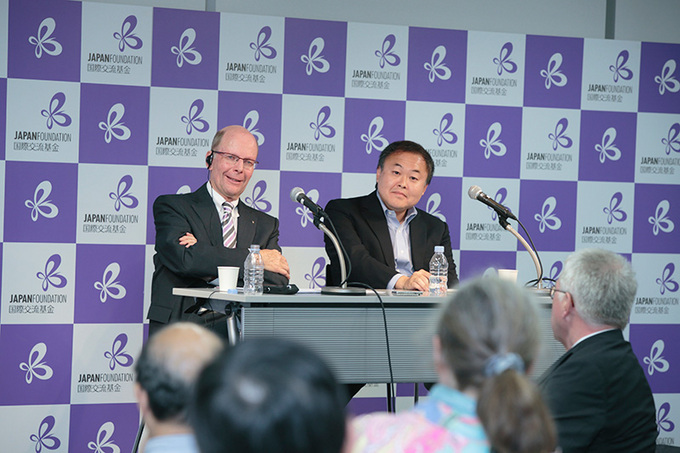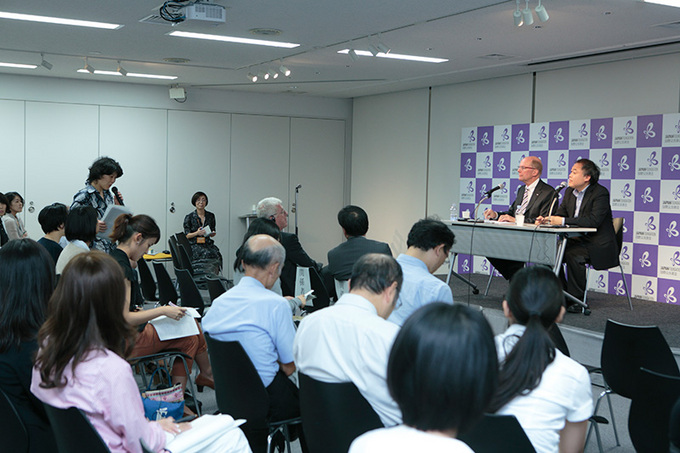Cultural Diplomacy - Opportunities and Limits of Soft Power in Foreign Policy (Part 2)
Kurt-Jürgen Maaß
Honorary Professor of University of Tübingen, Germany
The Japan Foundation held a lecture on opportunities and limits of soft power in foreign policy. The lecturer Kurt-Jürgen Maaß, former Secretary General (1998 - 2008) of the Institut für Auslandsbeziehungen, one of the leading German institutions for the country's soft power policy, discussed about the topic and introduced the specific cases in Europe.
The "part 2" reports the latter half of the lecture, followed by the thought-provoking comments given from Yasushi Watanabe, professor of Keio University, who has published numerous books on foreign cultural policy, and the discussion between Maaß and Watanabe.
(The following is a transcript of the lecture at the Japan Foundation JFIC Hall "Sakura" on September 19, 2013.)
--"Part 1" summary--
In the first half of the lecture, Maaß talked about his first involvement in post-war foreign cultural policy in Europe; studying abroad in UK and participating in the Franco-German Youth Office (FGYO) during his youth. Then, he analysed foreign cultural policy with the three key words brought from his work experience at the Alexander von Humboldt Foundation and the Institut für Auslandsbeziehungen. He began with the first key word of "advertisement", introducing German approach to foreign policy from a historical perspective, and went on to the second key word of "dialogue on values," explaining on the basis of the current German foreign policy.
Foreign media policy has become increasingly important
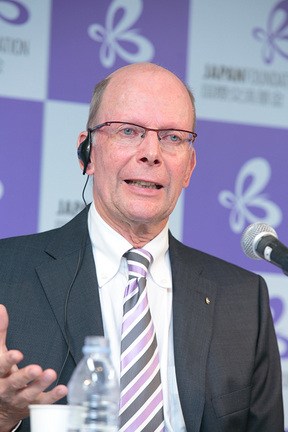 I would still like to mention one aspect of the dialogue on values that have also become increasingly important, namely foreign media policy. Previously, with the help of old and new media, it was about strengthening a country's image internationally and soliciting interest and sympathy. Today the direction has been significantly expanded to include the dialogue on values and support of the transformation process. The challenge is to make the national positions via the media more visible and tangible, and to successfully participate in the competition for interpretation of international news. This has become very difficult. Let me give you one example: the Arabian-language foreign television programs, especially Voice of America, Al Hurrah TV, BBC, France24, Russia Today (RT), CCTV China and to a small extent Deutsche Welle. The Arabsat satellite transfers these Western programs and another 380 Arabic language TV channels and makes them receivable in Arabian countries. This gives you an idea of the immense difficulty of even getting noticed in this environment. Ten years ago there were only three foreign television channels; today there are over 30. [1]
I would still like to mention one aspect of the dialogue on values that have also become increasingly important, namely foreign media policy. Previously, with the help of old and new media, it was about strengthening a country's image internationally and soliciting interest and sympathy. Today the direction has been significantly expanded to include the dialogue on values and support of the transformation process. The challenge is to make the national positions via the media more visible and tangible, and to successfully participate in the competition for interpretation of international news. This has become very difficult. Let me give you one example: the Arabian-language foreign television programs, especially Voice of America, Al Hurrah TV, BBC, France24, Russia Today (RT), CCTV China and to a small extent Deutsche Welle. The Arabsat satellite transfers these Western programs and another 380 Arabic language TV channels and makes them receivable in Arabian countries. This gives you an idea of the immense difficulty of even getting noticed in this environment. Ten years ago there were only three foreign television channels; today there are over 30. [1]
"Competition" in foreign cultural policy
With this, I will go on to the third part, and it is just as fascinating: namely competition. For the former Federal Republic of Germany, the predominant competitors in foreign cultural policy were the United States, Great Britain, France and Italy. With the increasing importance of culture in national foreign policy after 1990, the number of countries with their own strategies and own structures abroad has quickly grown. Today Member States of the European Union have over 2,000 cultural institutions abroad. Of the new players, Spain is the strongest, over the past 20 years, 77 Institutos Cervantes have been opened in 44 countries. In the fierce competition for a second foreign language, and thanks in part to support from pop culture, Spanish has triumphed and has thereby risen to a new level. In addition, in its foreign cultural policy Spain takes the role of a bridge to Latin America, making the country a strong competitor for Germany.
The unattainable competitor: UK
A big and in many respects unattainable competitor is the United Kingdom. The UK profits, of course, from the fact that English is today's lingua franca, the universal language, and it looks like it will hold on to its dominating position for some time to come. The UK has a cultural presence in more than 100 countries, and the British Council as the primary institution is very professionally run. British Council's plans for the future, formulated for the first time five years ago, are more modern and innovative than any other Western European national concept. The changes to content, based on an intensive evaluation spanning several years, to also include economic topics; the approach of intensified and mutual confidence-building measures and partnerships; and the second-to-none media presence via BBC makes the UK into a foreign cultural policy "superstar".
The biggest competitor: USA
If, however, the view is to research and the international scientific think tanks that accompany foreign policy, one gets the impression that the biggest competitor in today's foreign cultural policy is the United States. Nowhere else analysis is being performed with the same intensity and in part incisiveness - and that since the fall of the iron curtain and the publishing of the revolutionary book, The End of History and the Last Man, by U.S. political scientist Francis Fukuyama. Back then, the U.S. had to quickly recognise that history would carry on, from the violent breakup of Yugoslavia and the Rwandan Genocide in Africa up to September 11, 2001, and the wars in Iraq and in Afghanistan. Samuel P. Huntington's Clash of Civilisations and Joseph Nye's Soft Power became international bestsellers, and many governmentally appointed expert groups met over the course of years. Research groups formed at renowned universities like Harvard University or Georgetown University and at the University of Southern California a Center on Public Diplomacy was even founded. U.S. President Bill Clinton created a position of Under Secretary for "Public Diplomacy and Public Affairs" in the White House.
In 14 years, six people have tried to fill the role, and during this period the position was vacant for four years because no one wanted to take on the job.
The intensive discussion lasting a whole decade has apparently not helped at all, practically none of the new findings were put into practice, and the country's image in the Islamic world, which is very important and dominating in foreign policy, is still miserable. Totally disillusioned, in August 2012 New York-based think tank summarized in a white paper on The New Public Diplomacy Imperative: "The state of public diplomacy in the U.S remains much in the same state that it has over the past 10 years: under-financed, under-resourced, under-led and under the radar". [2]
The emerging competitor: China
A competitor to be taken much more seriously, however, is China. From the very beginning, Chinese government officials were intensive readers of Joseph Nye's book on soft power. One year after it was published in the Unites States, the book had already been translated into Chinese and brought out in Beijing. At that time China was in the process of thinking about its future position in the world politics and the role of culture in its foreign policy. Core components of the soft-power strategy were quickly implemented. However, it didn't take long for criticism to surface on the American proposition:
- The reduction of soft power to culture, values and foreign policy as an "attraction" for foreign countries was too narrow for Chinese observers. They argued that military power (!), economic strength and commercial success are also sources of attraction, as well as foreign and development aid. [3]
- Joseph Nye didn't even mention the technological and scientific progress of the United States as a soft power, though worldwide the U.S. enjoys the highest reputation as a result of these aspects. [4]
- In China soft power also has a domestic component, since it makes a contribution to the further development of the Chinese identity [5] and is thus an instrument of national interest.
- Even when other countries admire the United States for its successes and aspire to a similar prosperity, it does not mean that they want to support U.S. foreign policy. [6]
For China one of the goals of soft power is the protection of "legitimate" Chinese rights and interests abroad. In only eight years China has opened 400 Confucius Institutes in 108 countries all over the world - more than 60 in the United States. By 2020, the number is expected to rise to 1,000 institutions worldwide, and an additional 5,000 "Confucius classrooms". In the meantime, some 40 million non-Chinese are learning the Chinese language [7]. In 2010 the opening of colleges and universities in China brought some 265,000 students from 194 countries, and the goals for the future are aiming at 500,000 or even more. A network of foreign TV channels (China Central Television/CCTV) offers round-the-clock programmes in English, French, Spanish, Arabic and Russian; China Radio International (CRI) broadcasts in over 40 languages and provides websites in over 50 languages.
The growing competitor: Russia
For some years the Russian Federation has already become a further competitor in international foreign cultural policy, which is recognisable with the growing structure of Russian foreign cultural institutions - in the meantime in 76 countries. Russia puts value on an improved image abroad and primarily targets the Russian diaspora (which is estimated at around 27 million people) with five specialised TV channels. A further special focal point is the Russian language, since the fall of the Soviet Union, the number of Russian learners has drastically decreased everywhere.
The successful countries in East and Southeast Asia: Korea and Japan
In the meantime Korea (keyword: "hallyu" - Korean wave) and Japan have also developed their own active foreign cultural policies - not as aggressive as China and not as extensive in regard to quantity, and with other focal points. They have been successful primarily in East and Southeast Asia.
Prime Minister Abe wants to find ten of Japan's universities in the top 100 ranking of the world until 2020 - so far there are only two in this list. The number of foreign students should rise to 300,000 as compared to the current 120,000. The number of foreign tourists to Japan is projected to rise to 20 million per year as compared to 8 million today. Japan's pop culture such as manga or anime is supported to emerge as a source of global cultural strength, as well as is Japanese design or Japanese food in certain countries. These were goals formulated before the decision on the Olympic Games 2020. In my view Tokyo 2020 will be a unique occasion to completely rethink and reformulate the Japanese position on foreign cultural policy. With the help of the Olympic spirit and the worldwide interest for the games, Japan will be able to completely refurbish its image in the world. Let me congratulate you upon this chance!
Foreign cultural policy in future
Foreign cultural policy in industrial countries as well as in emerging countries has become a central part of foreign policy. The range of tasks has increased, and these additional tasks call for new competences and another way of thinking. The substantial international competition requires that politicians take a critical look at their concepts and strategies: Is the foreign cultural policy still on the right track for the foreseeable future challenges? Are the right questions being asked? Is the situation with worldwide competitors being taken seriously enough? Especially in the dialogue on values, do the goals have a chance of succeeding? These are just a few questions I ask myself. With the increased meaning of soft power, the accompanying scientific research has also become more important. This is a considerable chance for the universities.
Comments from Yasushi Watanabe, on Maaß's lecture
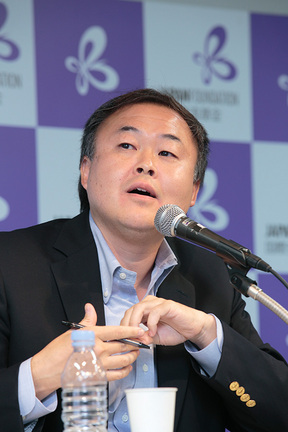 Dr. Maaß has a background in political science, whereas my specialty is cultural anthropology. Cultural anthropology is especially sensitive to relationships between culture and politics, culture and power, and culture and hegemony.
Dr. Maaß has a background in political science, whereas my specialty is cultural anthropology. Cultural anthropology is especially sensitive to relationships between culture and politics, culture and power, and culture and hegemony.
My personal thoughts about culture tend to be skeptical at all times. However, I understand the reality that culture plays an important role in democracy and international relations. I also realise that culture has positive possibilities. Thus, I am deeply interested in how the two aspects can be tied together, and so my interest in cultural diplomacy and public diplomacy comes as an extension of these thoughts.
I would like to walk through the three segments Dr. Maaß spoke of - advertisement, dialogue on values, and competition - with my comments and questions.
Thoughts on "advertisment/transmission" and "exchange"
I believe that the word transmission, in Japanese, contextually means the transmission of Japanese culture. It reminds me of something Tadashi Yamamoto, the founder of Japan Center for International Exchange, who pioneered post-war international exchange and who died last year, taught me about how exchange was more important than transmission. He said in a newspaper interview that "I often hear the word 'transmission' but I think what is important is 'exchange'." According to Mr. Yamamoto, transmission is a one-way street, whereas exchange goes both ways. It is interactive. To exchange means to create a community.
To transmit information is to choose a specific target such as diplomatic, cultural arts, education, or news media circles and to build a community within these. And among these, it nurtures people to understand Germany or Japan's position, for example. At the same time, as University of Southern California Professor Dr. Nicholas J. Cull mentions, it is important to listen to what others say rather than just stating your own position unilaterally.
We're inclined to see advertisement/transmission and exchange as being completely opposite, but they are not necessarily dichotomous. If something is simply transmitted, it could very likely become propaganda, but with exchange, this possibility can be reduced. As mentioned in the famous Elysee treaty between France and Germany, three hundred thousand programmes have been implemented, and eight million young people have traveled back and forth between the two countries. This is exchange, and I think that it is the best form of advertisement. Even if there are 6,000 neo-Nazis in Germany, the accumulation of past exchanges should be enough to keep Germany stable.
Dialogue on values
Issues such as peace-building, conflict prevention, human rights, poverty, environment, energy, democracy, and market economy that have been brought up are all vital to Japan's public diplomacy.
Public diplomacy in post-war Japan focused on Japan's uniqueness and peculiarities and put weight on emphasising Japanese public opinion and Japanese cultural theory. Perhaps from around the Gulf War of 1990, awareness of international contribution as a developed country rose and gave momentum to a more liberal sense of value. In other words, Japanese public diplomacy emphasises universality over particularity in recent years, and aims to share experiences and prioritizes cooperative work and partnerships.
In his lecture, Dr. Maaß mentioned that "Europe stands for enlightenment, progress, and tolerance." It is a fascinating phrase and I think Japan should follow suit. In theory, I agree with maintaining and expanding liberal world order, but as a cultural anthropologist, I question the extent of how this relates to cultures and human relations in so-called savage ethnicities. To date, I've witnessed several situations to which Western-centricity and Western values are being pushed. It is not my intention to advocate Asian values for the purpose of debate, but part of me finds it difficult to accept European and American values 100%.
I am reminded of a critical proposition by French literature scholar Kazuo Watanabe (who was a teacher to Nobel Prize winner Kenzaburo Oe): "In order to protect itself, must tolerance be intolerant of intolerance?" Europe respects enlightenment and tolerance, but I think the important issue is how far they can coexist.
Previously I took part in a discussion with Kosei Morimoto who serves as Chief Abbot at Todaiji Temple in Nara and at the same time holds a PhD in Islamic Studies. I asked him if polytheism and monotheism could co-exist. Reaching as far as he possibly could, he told me that they have a means and possibilities for coexistence. I also think that defines the true sense of liberal world order. That is, I do support liberal world order as long as it is not complacent. Liberal world order needs to become more liberal and there is no time like now that this is required that much.
It's fine for the Institute for Foreign Cultural Relations in Germany and the Japan Foundation to feel that they have to do something in order to keep up with China and Korea, but the important thing is fundamental debate.
Coexistence of "national interest" and "international gain"
At last, Dr. Maaß spoke about competition. He said that now the competition and struggle for supremacy is not just over military forces and money, but over cultural power, too. I agree that this is the reality as far as diplomacy and international relations are concerned. What is underlying is probably the understanding of culture based on realistic and strategic theory. This is where the concepts of soft power and public diplomacy come from.
However, I can also understand that there are people who show aversion to soft power and public diplomacy. Whether you're discussing soft power or public diplomacy, the bottom line is making a circle - increasing advocates. In other words, it's kind of like community or faction building. This happens in any world, but when it goes too far, there comes a need for rivalry and also a risk that could forward conflict: a negative spiral. Seeing public diplomacy as being merely a means to compete with China or Korea is not the way to a bright future. Within this, what is precisely required now is the attempt to change that competition to coordination.
Last week, a Japan-Korea Exchange Festival was held in Seoul. According to the media, it drew more than 40,000 people with a volunteer staff of more than 700, a size larger than ever. Not only that, most of volunteer staff were Korean and more than 130 companies sponsored the festival. Such valuable events are in the national interest of Japan, and very well of Korea. Meanwhile, this will likely benefit the international community beyond Japan and Korea. It is true that we need to be aware of national interest, and it may be most difficult to find the perfect equation to avoid conflict between national and international interest, but hopefully there can be a programme to satisfy both. This is the worthwhile part about working in this field.
Discussion between Maaß and Watanabe
Watanabe: I've provided my comments on the three topics: advertisement, dialogue on values, and competition and now I would like to ask Dr. Maaß three questions.
My first question is about culture. One would presume that anyone could take part in the topic, as culture is something we all live with. In reality however, it's not that easy, because culture has many aspects that need to be thought about. I think that developing human resources is decisively important. In your lecture you touched on the presence of higher education institutions such as the University of Southern California and the Fletcher School of Law and Diplomacy at Tufts University. In Japan, the situation for education programs to foster program officers is still poor. What is it like in Germany?
Next, I found it very interesting that you likened the UK to a "superstar", whereas Spain is a "rising star". Surely there are competitive elements that are conscious of national interest, but at the same time there is the mechanism of coordination. For example, there is a network of cultural organisations within the EU called EUNIC (European Union National Institutes for Culture). What is the actual situation of international cultural exchange in Europe in this respect?
Finally, I think it is the present situation to conclude that the most difficult aspect of public diplomacy is not public opinion overseas but rather gaining the understanding of politicians within the country. Right-wing politicians are likely to demand a direct approach, whereas left-wingers would wonder if there is money to spend on culture, and insist it should first be used on welfare. Business communities would be interested in generating profits, and ask for business evaluation and specific results. So the reality is that it would be difficult to gain understanding. A prime example of this in Japan is so-called Jigyo shiwake (budget screening process). How does Germany acquire domestic support?
Maaß: I especially welcome critical comments so I would first like to thank Dr. Watanabe for his comments that are full of insight.
There is a big difference between transmitting and exchanging information. Person-to-person encounters are the most effective in cultural diplomacy. The longer the encounter the better, of course, but in today's society, that costs a lot. Politicians, in consideration of their budget, might just as well use the Internet to send out their information.
Regarding the second keyword, dialogue on values, I found your comment quite interesting that Japan has been undergoing such a change. I think that it is the right direction to share historical experiences by conveying and then sharing unique culture. Of course, there's no need to apply the Western model to the entire world. Each country needs to adopt a part of the model and decide for itself which one is the most realistic.
If you think of whether democracy can take root in the Arab countries, the Japanese and European style of democracy might not. However, I do believe that there can be a political in-house process. I'm hoping that our large agenda will also trickle into their society and make a change.
In terms of being intolerant towards intolerance at the expense of tolerance, this would be difficult in cultural diplomacy. It could be even harder when dealing with certain countries. Say you cooperate with Saudi Arabia with the intention of having Egypt adopt elements of democracy. In that case, people of Islamic countries would wonder if the fact that you are working with another, most despotic country in the Middle East in the name of democracy is not a double standard of ethics. Of course continuing the dialogue on values is more convincing if you practice that value yourself. But it becomes less convincing if you say that you are cooperating with the despotic state for the sake of democracy, yet your real reason is because that country has the largest amount of crude oil reserves in the world.
If we wanted to become involved in dialogue with the Arabs, particularly the people like radical Salafists who aim to live the same way as the Muslims of the 9th century and claim to follow a way of living that Prophet Muhammad did in his era (editor's note: an ultra-conservative concept of faith espoused mainly in Saudi Arabia), they would not probably listen to us. In such a case, I would have to say that cultural diplomacy is very difficult.
Maaß: Let me briefly respond to the three questions from Dr. Watanabe.
There are 25 to 30 universities in Germany that offer courses in soft power and public diplomacy. Ten years ago, the Institute for Foreign Cultural Relations in Germany launched a society for researchers. It is an interdisciplinary organisation with 50 members that conducts workshops and publishes books.
EUNIC is a group that was established a few years ago, and that coordinates cultural organisations in Europe such as the Spanish national Instituto Cervantes, and the British Council of the UK. They have chiefly two types of activities. One, all major cities in Europe have cultural centers representing their own country. Since more than half of these are located in capital cities, representatives of each cultural center work closely with each other. Their other role is to promote European policies in other parts of the world as a partner institution of the European Union (EU). Such activities are subsided by EU headquarters in Brussels.
Finally, how we convince the parliament of Germany - this is extremely difficult. The reason is that foreign cultural policy is not exactly carried out within Germany, so some aspects would be difficult for the German parliament to fully understand. Members of the subcommittee on cultural diplomacy are lobbying such politicians. On behalf of public opinion, the committee lobbies in order to gain support from within the country.
(Photo: Atsuko Takagi)
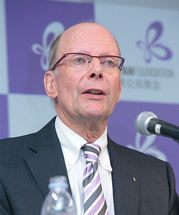 Kurt-Jürgen Maaß
Kurt-Jürgen Maaß
Kurt-Jürgen Maaß was born in 1943, and studied law in Hamburg, Lausanne, Speyer and Strasbourg, and obtained his Ph.D. from University of Hamburg. He previously worked in Brussels (NATO Parliamentary Assembly), Bonn (Alexander von Humboldt Foundation; German Ministry for Education and Science), Cologne (German Science Council), Stuttgart (Secretary General of the Institute for Foreign Cultural Relations) and Tübingen (Honorary Professor at the Institute for Political Science, University of Tübingen). His research subjects have been foreign cultural policy, European-Arabic dialogue, crisis prevention in foreign policy and foreign policy counseling.
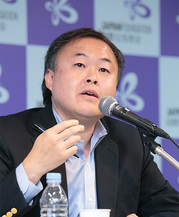 Yasushi Watanabe
Yasushi Watanabe
Yasushi Watanabe earned a Ph.D. in Social Anthropology from Harvard University in 1997. After post-doctoral research at Cambridge and Oxford Universities, he joined Keio University Shonan Fujisawa Campus (SFC) where he currently specialises in American studies and cultural policies. Watanabe, a Japan Academy Medal recipient in 2005, previously served two fellowships, the first at the Weatherhead Center for International Affairs at Harvard University under the Japan Foundation Abe Fellowship Program from 2003-2004 and another at Downing College, University of Cambridge, in 2007.
He has served as Executive Director of the Japanese Association for American Studies and on the Advisory Council on Public Diplomacy at the Japanese Ministry of Foreign Affairs; he is also an editorial member of Gaiko (Diplomacy) magazine and a book reviewer for Asahi Shimbun. His books include After America: Trajectories of the Bostonians and the Politics of Culture (2004), which won a Suntory Prize for Social Sciences and Humanities and the Hiroshi Shimizu Award from the Japanese Association for American Studies; Culture and Diplomacy: The Age of Public Diplomacy (2011); and the co-edited volume Soft Power Superpowers: Cultural and National Assets of Japan and the United States (2008).
1. Deutsche Welle, Evaluationsbericht 2012, Februar 2010, p. 7
2. Matthew Wallin, The New Public Diplomacy Imperative. America's Vital Need to Communicate Strategically, American Security Project, New York, 2012, p. 5
3. Hongyi Lai, The soft power concept and a rising China, p. 5 und 13, in: Hongyi Lai/Yiyi Lu (editors), China's Soft Power and International Relations, 2012, p. 1 - 20
4. L.c.p. 6
5. Yongnian Zheng und Chi Zhang, ‚Soft power' and Chinese soft power, p. 23, in: Hongyi Lai/Yiyi
Lu (editors), China's Soft Power and International Relations, 2012, p. 21 - 38
6. L.c.p. 24
7. Helmut K. Anheier und Bernhard Lorentz (editors), Wege der Verständigung, Stiftung Mercator, Essen 2012, p. 108
Back Issues
- 2019.8. 6 Unraveling the Maker…
- 2018.8.30 Japanese Photography…
- 2017.6.19 Speaking of Soseki 1…
- 2017.4.12 Singing the Twilight…
- 2016.11. 1 Poetry? In Postwar J…
- 2016.7.29 The New Generation o…
- 2016.4.14 Pondering "Revitaliz…
- 2016.1.25 The Style of East As…
- 2015.9.30 Anime as (Particular…
- 2015.9. 1 The Return of a Chin…


